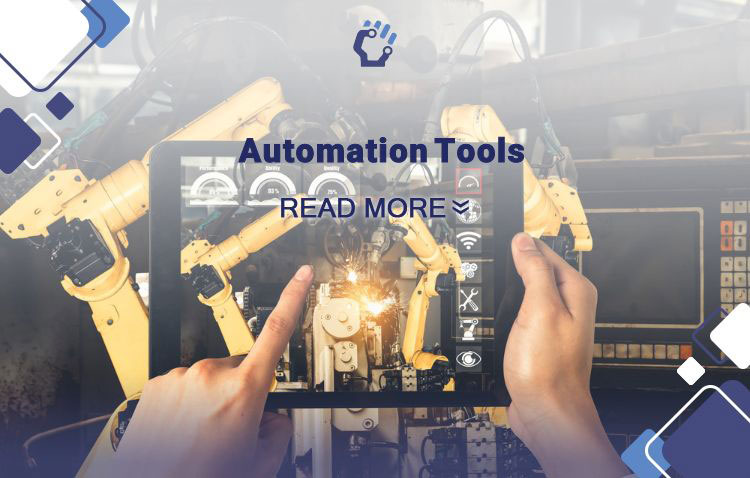Automation tools are software applications that can perform tasks or processes automatically, without human intervention. Automation tools can help businesses improve efficiency, productivity, quality, and customer satisfaction while reducing costs, errors, and risks. Automation tools can also enable businesses to innovate, adapt, and scale faster in a competitive and dynamic market.
In this article, we will explore how automation tools can benefit different aspects of business operations, from workflow management to software development. We will also look at some of the best practices and strategies for implementing automation tools in your business, as well as the future trends and challenges of automation tools.
Exploring Automation Tools for Increased Efficiency
Automation tools can help businesses streamline and optimize their workflows, by automating repetitive, manual, or complex tasks. For example, automation tools can:
- Automate email marketing campaigns, social media posts, or customer service responses, using tools like Mailchimp, Hootsuite, or Zendesk.
- Automate data entry, invoicing, accounting, or reporting, using tools like QuickBooks, Excel, or Power BI.
- Automate inventory management, order fulfillment, or shipping, using tools like Shopify, Amazon, or FedEx.
- Automate project management, collaboration, or communication, using tools like Asana, Slack, or Zoom.
By using automation tools, businesses can save time, money, and resources, while improving accuracy, consistency, and reliability. Automation tools can also free up employees from mundane or tedious tasks, and allow them to focus on more creative, strategic, or value-added activities.
Unleashing the Power of Automation Tools in Business Operations
One of the most popular and powerful types of automation tools is Robotic Process Automation (RPA). RPA is a technology that uses software robots or digital workers to mimic human actions and interact with various systems and applications. RPA can automate any rule-based, structured, or standardized process, such as data extraction, validation, manipulation, or transfer.
RPA can help businesses automate processes that are:
- High-volume: RPA can handle large amounts of data or transactions, without compromising speed or quality.
- High-frequency: RPA can run 24/7, without breaks or interruptions, and can scale up or down as needed.
- High-error: RPA can eliminate human errors, such as typos, omissions, or inconsistencies, and can ensure compliance and security.
- High-cost: RPA can reduce labor costs, operational costs, or overhead costs, and can increase revenue and profitability.
RPA can also integrate with other automation tools, such as Workflow Automation, Task Automation, or Scripting Tools, to create end-to-end automation solutions. Workflow Automation is a technology that can automate the coordination and execution of multiple tasks or processes, based on predefined rules or triggers. Task Automation is a technology that can automate specific or individual tasks, such as sending emails, generating documents, or scheduling appointments. Scripting Tools are tools that can automate tasks or processes by writing and running scripts or codes, such as Python, PowerShell, or Bash.
Navigating the Landscape of Automation Tools in Software Development
Another area where automation tools can have a significant impact is software development. Software development is a complex and dynamic process that involves various stages, such as planning, designing, coding, testing, deploying, and maintaining software applications. Automation tools can help software developers automate and improve each stage of the software development lifecycle, such as:
- DevOps Automation: DevOps is a set of practices that aims to unify the development and operations teams, and to deliver software faster, better, and more reliably. DevOps Automation is a technology that can automate the integration, delivery, and deployment of software, using tools like Jenkins, Docker, or Kubernetes.
- Test Automation: Test Automation is a technology that can automate the testing of software, such as functional testing, performance testing, or security testing, using tools like Selenium, JMeter, or Nmap.
- Continuous Integration (CI) and Continuous Deployment (CD): CI and CD are practices that aim to integrate and deploy software code frequently and consistently, using automation tools. CI is a practice that automates the integration of code changes from multiple developers into a single source code repository, using tools like Git, GitHub, or Bitbucket. CD is a practice that automates the deployment of code changes to various environments, such as testing, staging, or production, using tools like Ansible, Chef, or Puppet.
By using automation tools, software developers can reduce errors, bugs, or defects, and enable faster and more frequent releases.

Revolutionizing Workflows with Automation Tools
Automation tools can not only enhance existing workflows but also create new and innovative workflows that can revolutionize the way businesses operate. Automation tools can enable businesses to:
- Automate complex or cognitive tasks, such as decision-making, problem-solving, or learning, using tools like Artificial Intelligence (AI), Machine Learning (ML), or Natural Language Processing (NLP).
- Automate cross-functional or cross-domain tasks, such as marketing, sales, or customer service, using tools like Customer Relationship Management (CRM), Marketing Automation, or Chatbots.
- Automate end-to-end or customer-centric tasks, such as order processing, delivery, or feedback, using tools like E-commerce, Internet of Things (IoT), or Blockchain.
By using automation tools, businesses can create new and improved products, services, or experiences that can meet or exceed customer expectations, and create competitive advantages or differentiation.
The Power of Efficiency: Unleashing Automation Tools Across Industries
Automation tools can benefit businesses across various industries, sectors, or domains, such as:
- Manufacturing: Automation tools can automate the production, assembly, or quality control of goods, using tools like Industrial Robots, Computer-Aided Design (CAD), or Computer-Aided Manufacturing (CAM).
- Healthcare: Automation tools can automate the diagnosis, treatment, or monitoring of patients, using tools like Medical Robots, Electronic Health Records (EHR), or Telemedicine.
- Education: Automation tools can automate the teaching, learning, or assessment of students, using tools like Educational Robots, Learning Management Systems (LMS), or Adaptive Learning.
- Finance: Automation tools can automate the analysis, trading, or management of financial data, using tools like Financial Robots, Algorithmic Trading, or Robo-Advisors.
- Entertainment: Automation tools can automate the creation, distribution, or consumption of entertainment content, using tools like Entertainment Robots, Content Generation, or Streaming Services.
By using automation tools, businesses can increase their efficiency, effectiveness, or excellence, and achieve higher levels of performance, quality, or satisfaction.

Elevating Productivity: A Deep Dive into Automation Tool Strategies
To successfully implement and leverage automation tools in your business, you need to have a clear and comprehensive automation strategy, that can guide your automation journey. An automation strategy should include the following elements:
- Automation Vision: Your automation vision is your long-term goal or aspiration for automation, that aligns with your business vision, mission, or values. Your automation vision should answer the question: Why do you want to automate?
- Automation Scope: Your automation scope is your short-term or medium-term objective or target for automation, that defines what you want to automate, how much you want to automate, and when you want to automate. Your automation scope should answer the question: What do you want to automate?
- Automation Assessment: Your automation assessment is your evaluation or analysis of your current state of automation, that identifies your automation readiness, maturity, or gaps. Your automation assessment should answer the question: Where are you now in terms of automation?
- Automation Roadmap: Your automation roadmap is your plan or blueprint for automation, that outlines your automation steps, milestones, or deliverables. Your automation roadmap should answer the question: How will you get there in terms of automation?
- Automation Metrics: Your automation metrics are your measures or indicators of automation, that track your automation progress, performance, or impact. Your automation metrics should answer the question: How will you know if you are successful in terms of automation?
By having an automation strategy, you can ensure that your automation efforts are aligned, coordinated, and optimized and that you can achieve your automation goals and benefits.
Orchestrating Success: The Central Role of Automation Tools
Automation tools are not only a means to an end, but also an end in themselves. Automation tools are not only a way to improve your business processes, but also a way to improve your business outcomes. Automation tools are not only a tool to support your business strategy, but also a tool to shape your business strategy.
Automation tools can help you orchestrate your success, by enabling you to:
- Create value: Automation tools can help you create value for your customers, stakeholders, or society, by delivering superior products, services, or experiences, that solve their problems, meet their needs, or fulfill their desires.
- Capture value: Automation tools can help you capture value for your business, shareholders, or employees, by generating revenue, profit, or growth, that reflects your performance, potential, or impact.
- Sustain value: Automation tools can help you sustain value for your future, environment, or legacy, by ensuring resilience, sustainability, or innovation, that demonstrates your adaptability, responsibility, or vision.
By using automation tools, you can transform your business and boost your bottom line, and achieve your ultimate success.
Future-Proofing Workflows: A Glimpse into Automation Tools Evolution
Automation tools are constantly evolving, as technology advances, customer demands change, and business challenges emerge. Automation tools are becoming more intelligent, autonomous, and collaborative, and are creating new possibilities and opportunities for businesses. Some of the emerging trends and challenges of automation tools are:
- Intelligent Automation: Intelligent Automation is a technology that combines RPA with AI, ML, or NLP, to automate complex or cognitive tasks, such as decision-making, problem-solving, or learning. Intelligent Automation can help businesses automate tasks that require human judgment, reasoning, or creativity, and can enhance the capabilities and performance of automation tools.
- Machine Learning Automation: Machine Learning Automation is a technology that automates the process of building, training, and deploying machine learning models, using tools like AutoML, DataRobot, or H2O. Machine Learning Automation can help businesses automate tasks that involve data analysis, prediction, or optimization, and can enable them to leverage the power of machine learning without requiring extensive coding or expertise.
- DevOps Automation: DevOps Automation is a technology that automates the integration, delivery, and deployment of software, using tools like Jenkins, Docker, or Kubernetes. DevOps Automation can help businesses automate tasks that involve software development, testing, or deployment, and can enable them to deliver software faster, better, and more reliably.
- Test Automation: Test Automation is a technology that automates the testing of software, such as functional testing, performance testing, or security testing, using tools like Selenium, JMeter, or Nmap. Test Automation can help businesses automate tasks that involve software quality, performance, or security, and can enable them to reduce errors, bugs, or defects, and improve customer satisfaction.
- Continuous Integration (CI) and Continuous Deployment (CD): CI and CD are practices that aim to integrate and deploy software code frequently and consistently, using automation tools. CI is a practice that automates the integration of code changes from multiple developers into a single source code repository, using tools like Git, GitHub, or Bitbucket. CD is a practice that automates the deployment of code changes to various environments, such as testing, staging, or production, using tools like Ansible, Chef, or Puppet. CI and CD can help businesses automate tasks that involve software delivery, deployment, or feedback, and can enable them to accelerate and optimize their software releases.
Navigating the Spectrum: Practical Applications of Automation Tools in Daily Operations
Automation tools can be applied to various tasks or processes in daily operations, depending on the level of complexity, frequency, or value of the task or process. Some of the practical applications of automation tools are:
- Workflow Automation: Workflow Automation can be used to automate tasks or processes that are simple, routine, or standardized, such as data entry, invoicing, accounting, or reporting. Workflow Automation can help businesses save time, money, and resources while improving accuracy, consistency, and reliability.
- Task Automation: Task Automation can be used to automate tasks or processes that are specific, individual, or customized, such as sending emails, generating documents, or scheduling appointments. Task Automation can help businesses increase efficiency, productivity, or quality while reducing costs, errors, or risks.
- Scripting Tools: Scripting Tools can be used to automate tasks or processes that are complex, dynamic, or flexible, such as data extraction, validation, manipulation, or transfer. Scripting Tools can help businesses enhance their capabilities, performance, or impact while enabling them to innovate, adapt, or scale.
Automation tools can help businesses automate tasks or processes that are high-volume, high-frequency, high-error, or high-cost, and can create value, capture value, or sustain value for their customers, stakeholders, or society. Automation tools can also help businesses automate tasks or processes that are low-volume, low-frequency, low-error, or low-cost, and can improve their efficiency, effectiveness, or excellence, and achieve higher levels of performance, quality, or satisfaction.
Automation tools can transform your business and boost your bottom line, by streamlining and optimizing your workflows, creating and delivering superior products, services, or experiences, and achieving your ultimate success. Automation tools can also future-proof your workflows, by enabling you to leverage the latest technologies, meet the changing customer demands, and overcome emerging business challenges.
If you want to learn more about automation tools, you can use the links I provided in my response, or you can search the web using Bing.

Conclusion
Automation tools are software applications that can perform tasks or processes automatically, without human intervention. Automation tools can help businesses improve efficiency, productivity, quality, and customer satisfaction while reducing costs, errors, and risks. They can also enable businesses to innovate, adapt, and scale faster in a competitive and dynamic market.
In this article, we have explored how automation tools can benefit different aspects of business operations, from workflow management to software development. We have also looked at some of the best practices and strategies for implementing automation tools in your business, as well as the future trends and challenges of automation tools.
Automation tools can not only enhance existing workflows but also create new and innovative workflows that can revolutionize the way businesses operate. Automation tools can enable businesses to automate complex or cognitive tasks, such as decision-making, problem-solving, or learning, using tools like Artificial Intelligence (AI), Machine Learning (ML), or Natural Language Processing (NLP). Automation tools can also enable businesses to automate cross-functional or cross-domain tasks, such as marketing, sales, or customer service, using tools like Customer Relationship Management (CRM), Marketing Automation, or Chatbots. Automation tools can also enable businesses to automate end-to-end or customer-centric tasks, such as order processing, delivery, or feedback, using tools like E-commerce, Internet of Things (IoT), or Blockchain.
We hope that this article has given you some insights and inspiration on how automation tools can transform your business and boost your bottom line.








